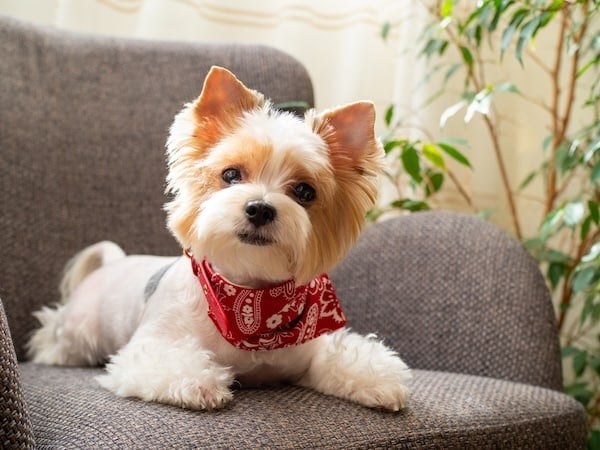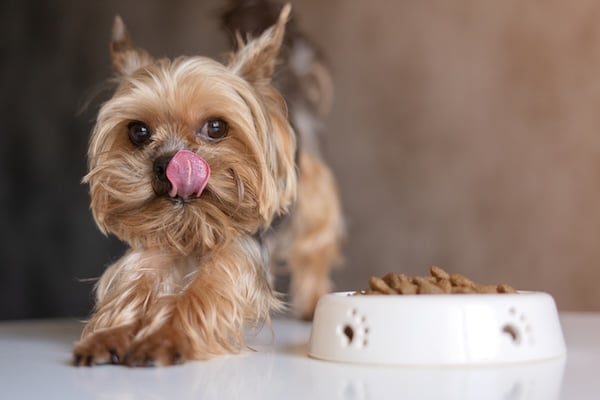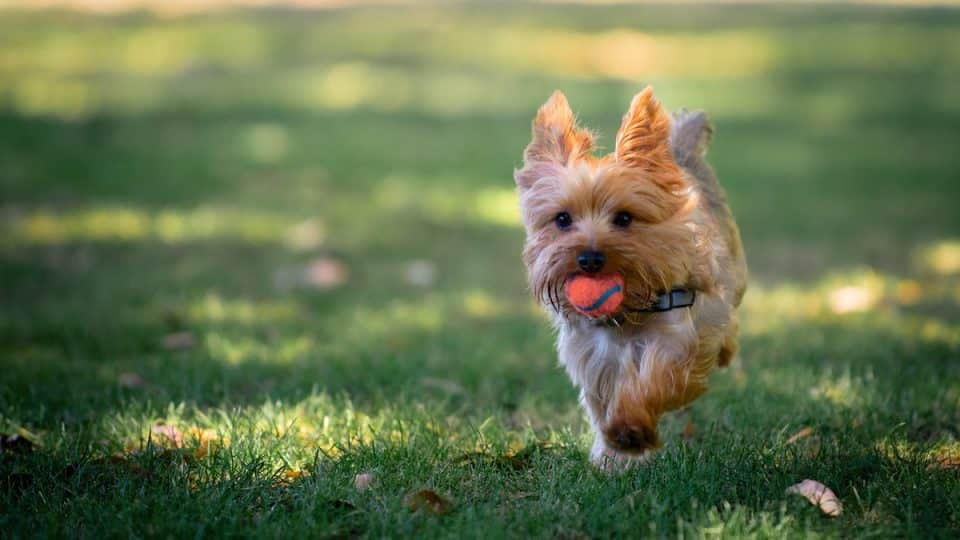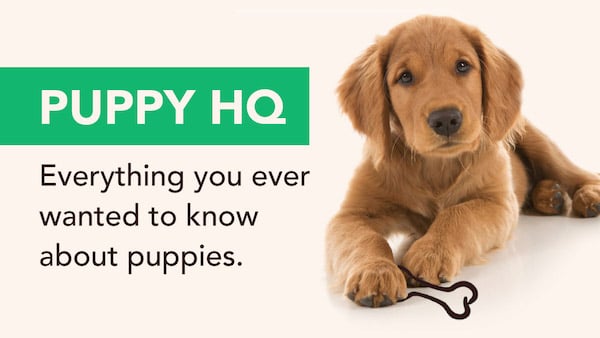- Not a substitute for professional veterinary help.
If you can’t resist an adorable puppy, you’ll surely fall for the teeny, tiny Yorkshire Terrier. Yorkie puppies are especially small and irresistible, only weighing around 10 to 16 ounces by the time they’re old enough to go home. In their first six to eight months, these pups resemble little teddy bears with pointed ears and a fluffy, petite frame. By their first birthday, their soft puppy fur will have transitioned into the breed’s signature glossy coat.
Known for their larger-than-life personalities, Yorkshire Terriers are bold, spunky, and affectionate. While they don’t need much space, they do need plenty of attention, playtime, and diligent grooming. That goes double for puppies. “If considering adopting a Yorkie puppy, be prepared to fall in love, but more than anything, make sure you have energy, patience, and time,” says Tiffini Cartozian, president of the Yorkie Rescue of America. “These tiny, adorable puppies are very smart, very active, and love to play.”
A Yorkie pup typically costs between $1,000 and $3,000 from a breeder, with American Kennel Club (AKC) show-quality Yorkies often priced at $3,500 or more. Rescues are typically more affordable (usually less than $1,000 for the adoption fee) and offer the chance to bring home a Yorkie puppy in need.
Key Yorkshire Terrier Puppy Facts
- Litter size: Yorkies typically have 3 to 4 puppies in a litter, which is normal for toy breeds—smaller pups equal smaller litters.
- Puppy weight: A baby Yorkie is absolutely tiny. When they’re ready to go home at 8 to 10 weeks, most stand just 2 to 4 inches tall and weigh less than a pound.
- Puppy temperament: The biggest challenge with your Yorkie puppy will be curbing barking from the start. These pups have a lot to say, and their “big dog in a little body” persona can make them a bit bossy, which can sometimes get them into trouble. Both behaviors, however, can be modified and managed with consistent training, especially when started early in puppyhood.
- Energy levels: Don’t be fooled by their size—Yorkie puppies are spirited and have impressive energy reserves.
- Maturity: While Yorkies calm down a little bit around age two, these dogs are anything but mellow. Many Yorkies keep their spirited personality throughout their whole life.
- Unique traits: These incredibly lovable little pups are highly adaptable to all types of living spaces—including apartments.
- Bonding likelihood: Yorkies tend to form a strong bond with one individual. Even so, they have a lot of love and affection to give to other members of the household.

Svetlana Khoruzhaia via iStock
Where To Find Yorkshire Terrier Puppies
Adopting a Yorkie puppy can be challenging due to their high demand, but there are several paths you can take to become a pet parent to this breed.
- Rescue groups: Adopting through breed-specific rescues, such as the Yorkie Rescue of America, is one way to avoid the long wait time. You’re more likely to find adult Yorkies than puppies going this route, however. Yorkies in shelters and at rescues are typically surrendered by former guardians who underestimated the breed’s energy levels, vocal nature, or grooming needs.
- Show breeders: The Yorkshire Terrier Club of America is a great resource for prospective pet parents looking to work with a reputable breeder. This national breed club focuses on breeding healthy Yorkies that adhere to breed standards.
- Online marketplaces: Online marketplaces such as the American Kennel Club or Good Dog offer additional avenues for finding this breed.
You might encounter breeders selling “teacup” and “miniature” Yorkie puppies. These variations are simply marketing terms used to describe Yorkies smaller than the standard size—it’s not a designation recognized by reputable breed organizations. Breeding for smaller Yorkie sizes is not recommended, as it can lead to health and genetic issues.
Recommended health tests
When adopting a puppy, it’s essential to ask about their vaccination history, the health history of their parents, and any breed-specific testing that has been done. To keep your Yorkshire Terrier in good health, the National Breed Club and Orthopedic Foundation for Animals (OFA) recommend several health screenings:
- Patella evaluation: As Yorkies are prone to dislocating their kneecap, the OFA suggests a patella evaluation to assess the kneecap and surrounding joints.
- Ophthalmologist evaluation: This breed may also be prone to certain eye problems. The OFA and the American College of Veterinary Ophthalmologists recommend regular testing and diligent care for your pup’s eyes.
- Cardiac exam: Your Yorkie will benefit from cardiac exams to ensure a healthy heart.
- Liver function testing: Yorkshire Terriers are at risk of developing a portosystemic shunt (or liver shunt), which can be detected through regular testing of liver function.
- Genetic testing: GM1 and GM2 gangliosidoses are rare, inherited enzyme disorders that can occur in Yorkies. They can be detected through genetic testing.
- Hypoglycemia monitoring: Yorkies can develop hypoglycemia, particularly as puppies. Hypoglycemia can be detected through blood glucose testing.
- Tracheal collapse monitoring: Small breeds, such as Yorkies, are at a higher risk for tracheal collapse. If your puppy is experiencing a chronic cough or difficulty breathing, your vet can help assess if this is related to tracheal collapse.
- Retained puppy teeth check: Since Yorkies are prone to retaining baby teeth, an annual vet visit can help monitor oral health and check for this issue.
Yorkshire Terrier Puppy Physical Characteristics
Newborn Yorkie puppies are tiny at birth, weighing just a few ounces, but they grow quickly in their first few months of life. By the first year, most Yorkies will reach close to their adult size. This growth means new pet parents should prepare early for key stages of development, including training milestones and puppy-proofing.
| Age | Approximate Height | Approximate Weight | Tips |
| 8 weeks (2 months) | 2-4 inches | 1-1.5 pounds | Supervise your tiny puppy diligently, especially when around other pets and children. |
| 12 weeks (3 months) | 3-5 inches | 1.5-2.5 pounds | Block off small spaces in the home that your puppy might squeeze into and get stuck. The same applies to the outside, preventing your Yorkie from escaping through small gaps in the fence. |
| 18 weeks (4 months) | 4-7 inches | 2.5-4.5 pounds | Ensure that your brave and curious puppy doesn’t jump off furniture and high surfaces. |
| 26 weeks (6 months) | 6-7 inches | 4-5.5 pounds | Your Yorkie puppy will be entering the adolescent stage and will likely need more physical and mental stimulation to burn off excess energy. |
| 34 weeks (8 months) to 1 year | 7-9 inches | 5-7 pounds | Yorkies should have reached their mature size and developed their adult coat by this point, which will require regular upkeep. |
Raising a Well-Adjusted Yorkshire Terrier Puppy
Tenacious Yorkies are fun-loving companions, but their huge personalities can make puppy training a challenge. Patience and perseverance are important, since early socialization and consistent training are crucial for raising a well-adjusted Yorkie.
Breed-specific training needs
Yorkie puppies are both highly intelligent and extremely strong-willed, making training difficult for new pet parents. These pups can also be picky eaters, making it hard to find high-value treats to motivate them.
Your best bet is to get started with positive reinforcement training early, especially regarding barking, before unwanted habits are established. Getting professional help on board can also help you develop a tailored plan for your specific Yorkie pup.
Socialization
Early socialization is especially crucial for Yorkies for a few different reasons:
- Yorkies can be wary of strangers. Socializing your Yorkie pup to different types of people will help them grow into a friendly, confident dog (instead of an overprotective and anxious one).
- Yorkies sometimes act too big for their britches around other dogs. Early socialization with other dogs is critical to prevent your Yorkie puppy from developing the habit of bossing around other pups, particularly big breeds who might not appreciate being sassed by a pint-sized pup.
- Yorkies are sound-sensitive. Since these little watchdogs are alert barkers, the more you desensitize them to a variety of sounds, the fewer alerts you’ll get.
- A Yorkie coat needs constant grooming. Your Yorkie’s luscious locks will require a lifetime of upkeep. Getting your puppy used to handling and grooming early in puppyhood will ensure they’re comfortable with the process later.
Potty training
Because of their small bladders and stubborn nature, Yorkie puppies are considered extremely hard to potty train. While pee pads might seem like a good solution, Yorkies may become strongly attached to them, deterring them from wanting to transition to going outside. If possible, start outdoor potty training immediately, even if it means letting your puppy out once every hour until they get the idea.
Crate training
Yorkies form strong attachments with their humans, so it’s common for them to develop separation anxiety. Getting them comfortable with a crate during puppyhood and establishing it as a cozy, safe haven can help ease them into being left alone. Just ensure you’re also crate training while you’re at home, so they don’t equate the crate with you leaving and develop a negative association with it.
Lifestyle exercise and activities
Despite their tiny size, Yorkies have high energy levels and need more exercise than most small-breed puppies. Ensure you’re scheduling in plenty of time each day for walks, games, and play. Agility is also a popular sport for Yorkies and can be a fun activity to enjoy together.

Valeriya21 via iStock
Grooming Routine for a Yorkshire Terrier Puppy
Getting your Yorkie used to regular grooming as a puppy will not only keep them clean and healthy, but it will also prepare them for more involved upkeep as an adult. Begin with daily brushing to prevent tangles in their puppy coat, and follow with regular baths using a puppy-safe shampoo.
Practice handling and getting your pup comfortable with nail trimming, teeth brushing, and cleaning their ears and around their eyes. (Yorkies are prone to tear stains!)
You can also practice what it will be like when they start getting haircuts. Yorkie pups typically lose their puppy coat around four months, so preparing them for professional grooming sessions early on can help this aspect of care stay a positive experience.
Health Considerations
Though Yorkies are generally a healthy breed, monitoring your puppy’s well-being is essential to responsible pet parenthood. Since Yorkies are notoriously picky eaters, it’s a good idea to chat with your vet if you’re having trouble getting your pup to eat. Your veterinarian will also play a crucial role in monitoring for signs of hypoglycemia, dental issues, tracheal collapse, and other breed-specific health risks.
Yorkies are quite fearless, but their small size makes them more susceptible to injuries. Enrolling early in a pet insurance policy can help protect you and your pup should an unexpected emergency occur.
Essential Yorkshire Terrier Puppy Checklist
“If you adopt a Yorkie as a puppy, you will have the ultimate best friend for the duration of their life,” says Cartozian. Before you welcome a new Yorkie puppy into your home, here are a few things to help keep your tiny companion healthy, happy, and safe:
- Puppy food: Choose a small-breed puppy formula, and consider offering a mix of wet and dry food to encourage consistent eating habits for these finicky eaters. If you’re unsure where to start, consult with your vet!
- Walking gear: A soft, adjustable harness and lightweight leash will reduce pressure on a Yorkie’s delicate trachea.
- Crate: Choose a small crate that includes a divider panel, which will discourage your Yorkie from going potty inside while allowing you to adjust the space as they grow.
- Small toys: Opt for appropriately sized toys for small-breed puppies that are lightweight and small enough for your Yorkie to chew, carry, and toss around.
- Training support: Yorkie puppies can benefit from both group and private sessions. Group puppy classes can help teach them how to interact politely with other dogs without bossing them around. A private trainer can also help you address specific issues, such as troubleshooting potty training problems or identifying particular sounds at home that your Yorkie finds triggering.




